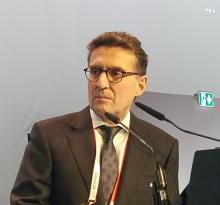PHILADELPHIA – Higher doses of evobrutinib significantly improved that study endpoint, and were associated with numerical decreases in the annualized relapse rate versus placebo, according to a report presented at the annual meeting of the American Academy of Neurology.
Some grade 3-4 transaminase elevations were associated with evobrutinib, though these were asymptomatic, reversible, and occurred within the first 24 weeks of the 48-week treatment period, said investigator Xavier Montalban, MD, PhD, chairman and director of the department of neurology-neuroimmunology at Vall d’Hebron University Hospital in Barcelona.
“Overall, we do believe the results of the phase 2 study support further clinical development in relapsing multiple sclerosis,” Dr. Montalban said.
This study builds on previous observations that BTK plays an important role in immune functions related to the pathogenesis of MS, Dr. Montalban said. Evobrutinib in particular impacts B cells and myeloid cells along with pathways involved in MS-related inflammation, he added.
In the current randomized, phase 2, placebo-controlled study, 267 patients with relapsing MS were randomized to one of five arms: placebo, evobrutinib 25-mg daily, 75-mg daily, or 75-mg twice daily, or an open-label reference arm of dimethyl fumarate 240 mg twice daily.
Dr. Montalban presented the results of a 24-week treatment period plus a 24-week blinded extension period, during which placebo-treated patients crossed over to evobrutinib 25 mg daily, for a total of 48 weeks of treatment.
The primary study endpoint was the cumulative number of MRI-assessed T1 Gd+ lesions at weeks 12, 16, 20, and 24. Dr. Montalban said that evobrutinib in the two 75-mg arms significantly reduced enhancing lesions versus placebo over weeks 12-24, with lesion rate ratios of 0.30 for the 75-mg daily arm, and 0.44 for the 75-mg twice-daily arm, with unadjusted P values of .002 and .031, respectively. By contrast, the evobrutinib 25-mg arm did not significantly reduce the cumulative number of enhancing lesions versus placebo over that time period.
There was a rapid reduction in the mean number of enhancing lesions from baseline to the week-12 visit for those 75-mg dosing arms, which was sustained through subsequent visits, Dr. Montalban said.
There were no significant differences between arms in the annualized relapse rate at week 24, a key secondary endpoint of the study, according to the investigators. The annualized relapse rate was 0.37 for placebo, 0.57 for evobrutinib 25 mg daily, 0.13 for the 75-mg daily dose, 0.08 for the 75-mg twice-daily dose, and 0.20 for dimethyl fumarate. The magnitude of reduction was maintained at the 48-week evaluation for evobrutinib 75 mg twice daily, with an annualized relapse rate of 0.11, Dr. Montalban reported.
Most treatment-emergent adverse events were mild or moderate, according to the investigators.
Reported ALT elevations in the evobrutinib arms were mainly grade 1. While some grade 3-4 elevations were seen in the first 24 weeks of the study, they were reversible and did not have clinical consequences, according to Dr. Montalban.
Results of the study were published concurrently in the New England Journal of Medicine.
Dr. Montalban provided disclosures related to Biogen, Merck Serono, Genentech, Genzyme, Novartis, Sanofi-Aventis, Teva Pharmaceuticals, Roche, Celgene, Actelion, National Multiple Sclerosis Society, and Multiple Sclerosis International Federation.
SOURCE: Montalban X et al. AAN 2019. Abstract S56.004.


